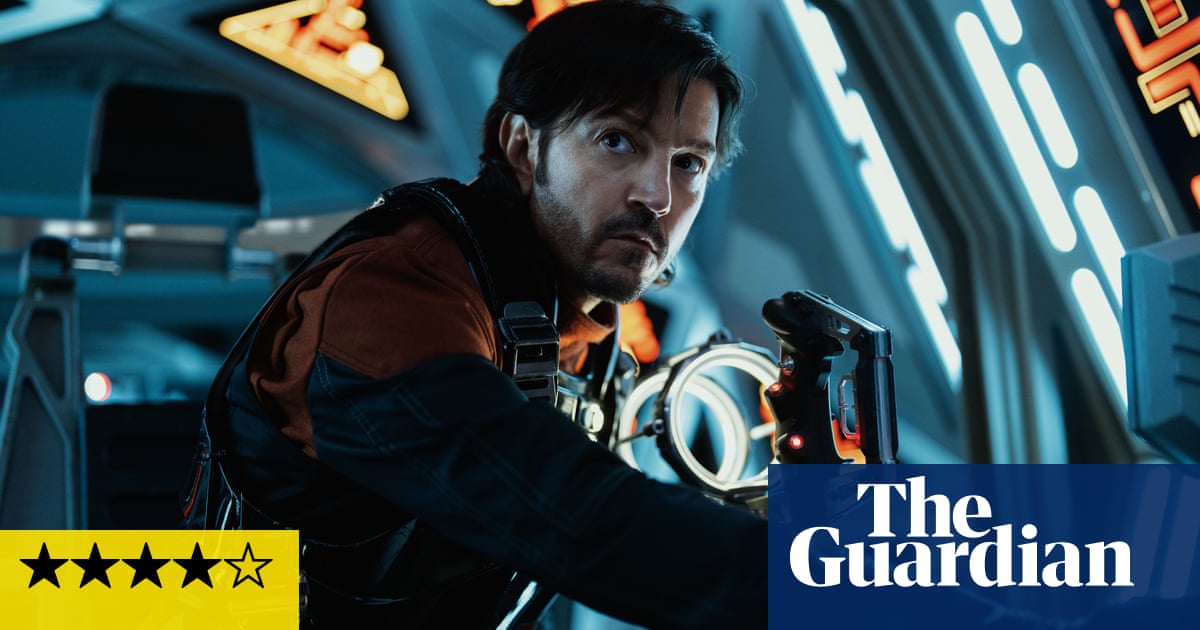Comrades! Welcome back to the revolution. Andor is theStar WarsTV show with the sharpest political acumen: yes, like everything in the franchise, it’s about an underdog rebel movement fighting against a totalitarian empire in space, and it has plenty of thrilling battle sequences, but here there are no Jedi mind powers or cute green backwards-talking psychics. Under the hard-nosed stewardship of writer Tony Gilroy, Andor bins the magic and myth and replaces it with the reality of anti-fascist struggle, where the good guys are ready to risk their lives for freedom. It’s the Star Wars spin-off with the strongest claim to being a proper drama – but, in season two’s opening triple bill, it shows it can do sly, wry comedy too.
We’re a year on from where we left off, which is four years before the Death Star blows up at the end of the original movie – the point at which all the work done by our hero, Cassian Andor (Diego Luna), pays off. We pick him up in an imperial military facility, where he’s posing as a test pilot for a spacecraft he intends to nick. There’s a classic Andor moment where Cassian meets the rebellion’s woman on the inside, a junior technician who has gathered her courage to make her contribution, and knows the rage of her superiors will be directed at her once Cassian has flown off. “If I die tonight, was it worth it?” she asks him, and gets a rousing speech in response, urgently whispered.
But once it’s revealed that the ship is more advanced than Cassian is used to and he doesn’t know how to fly it properly – forward and reverse are not where he expects – it’s clear that Andor has returned in an unusually playful mood. Soon Cassian is captured by a gang of inexperienced young mercenaries who are no danger to him, because being lost in a forest together without being able to agree who their leader is has turned them into a cross between the People’s Front of Judea and the cast ofYellowjackets. We wait, amused and expectant, for Cassian to outwit them and escape.
Meanwhile, in a meeting room atop a snowy Bond-villain mountain, Galactic Empire politicians are discussing the planet Ghorman and how best to extract its priceless deposits of “deep substrate foliated calcite”, the mining of which could cause the whole rock to break apart. Basically, they’re going to frack Ghorman to death. The rising star at the summit is Dedra Meero (Denise Gough), who has to decide whether owning the Ghorman project, with its likely death toll of 800,000, will serve her career ambitions.
Before she has a chance to nail that down, however, she is part of the sort of domestic scene that Andor isn’t afraid to include, even if it means putting the fight for intergalactic supremacy on hold. In the season one finale it was hinted that focused, calculating Dedra might enter into a symbiotic romantic relationship with callow, conniving failure Syril (Kyle Soller). And now here the two Empire loyalists are, cohabiting in a high-rise apartment with an extremely unwelcoming light-grey interior palette.
This is excellent news because Syril is perhaps Andor’s best character, representing the male emotional inadequates who tend to be a fascist movement’s foot soldiers. Syril is the sort of man who, on Earth, would be posting aggressive, grandstanding political opinions from a computer in his mother’s basement. Season one recognised this by having him actually move back in with his mother after a professional setback, and revealing her to be a textbook overprotective, vicariously ambitious mom played with fearsome comic smarts by the fabulous Kathryn Hunter. Now she is Dedra’s new in-law, and she’s on her way round for a lunch where the passive-aggression threatens to curdle the fondue.
We visit two other locations that seem unconnected but won’t stay that way for long. On the lush planet of Chandrila, comfortably wealthy senator Mon Mothma (Genevieve O’Reilly) is hosting a lavish wedding for her daughter, but the marriage is a grubby arranged affair that is about to tip Mon into betraying her upper-class lifestyle and leading the resistance instead.
Meanwhile, far away in the wheat fields of Mina-Rau, Cassian’s activist pals are trying to lay low while they await his return, but are subjected to an imperial inspection led by a smarmy officer who singles out Bix (Adria Arjona) for special attention. The power imbalance between them, with Bix recognising immediately that this man’s apparent friendliness is loaded with a threat of sexual violence, reminds us that even when it’s in a lighter mode, Andor is Star Wars for grownups. This rebellion is a serious business.
Andor is on Disney+ now
